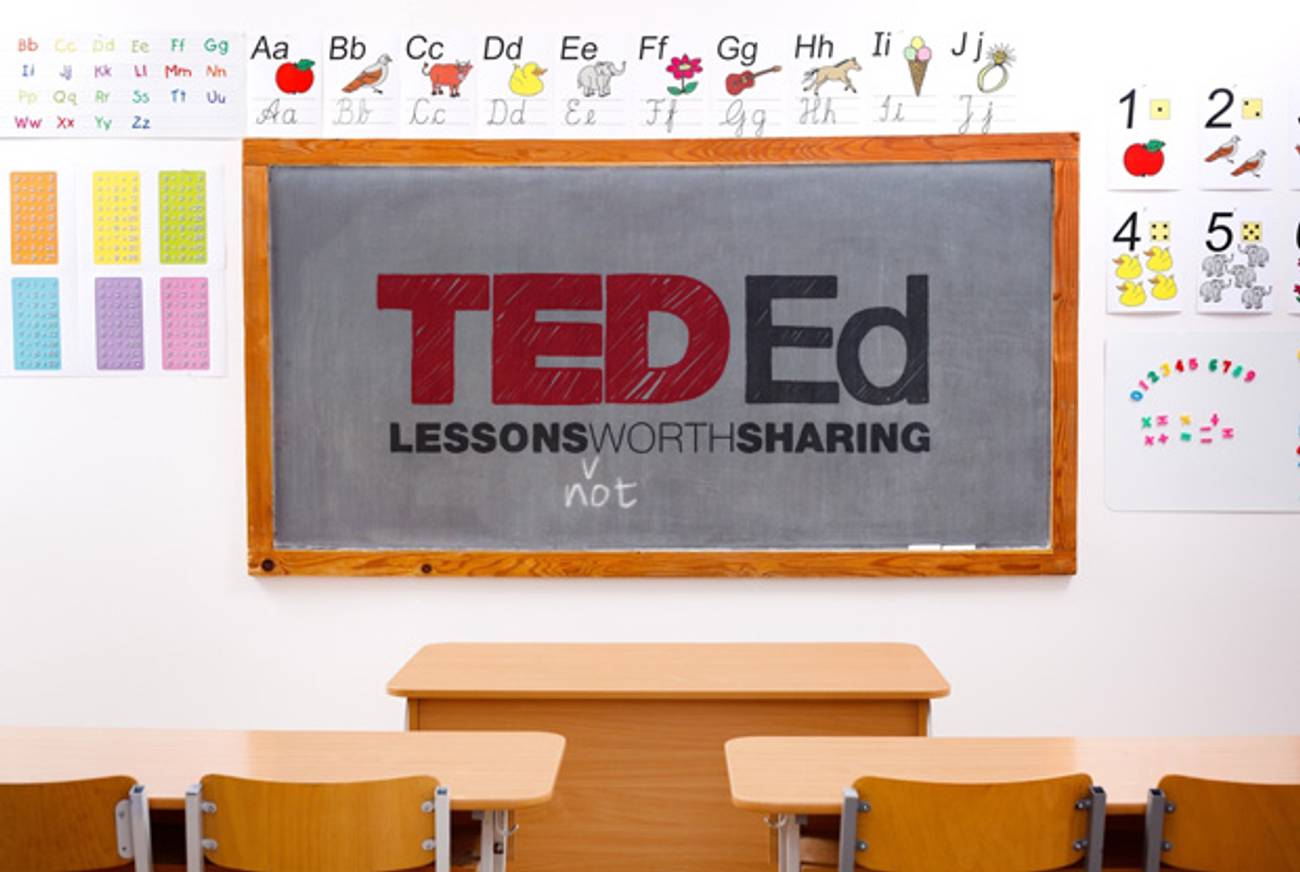TED Balks
The famed conference’s lectures can’t be educational tools, because the bite-sized videos trivialize big ideas




We need to talk about TED.
The high-profile conglomerate of conferences dedicated to bite-sized “ideas worth spreading” was a smashing enterprise when it began, back in the early 1990s, as a platform for innovators to discuss technology, entertainment, and design. It was fine as it slowly turned into a ludicrously pricey playdate—tickets are $6,000 a pop—for the world’s wealthy and easily amused. It was tolerable as its seemingly infinite stream of videos flooded the Internet, shooting up from 50 million views in 2009 to 500 million just two years later. But TED’s recent announcement introducing a new series of short animated lectures intended for college professors and their students should raise eyebrows, concerns, and voices in opposition. Entertaining as they may be, TED talks have no place in the classroom.
To understand why, and to put TED in some much-needed perspective, let us look at the conference’s greatest hits, those talks that generated millions of views and propelled the conference into cultural ubiquity. With few exceptions, TED talks come in three flavors: famous, in which folks like Al Gore or Bill Gates say whatever they damn please and it doesn’t matter because, hey, Al Gore! Bill Gates!; cool, in which computer scientists and marine biologists and astrophysicists jump on stage with tricked-out gizmos, amazing footage of octopi, or some other neat doodad for a brief show-and-tell; and moving, in which people tell other people that life is good and full of rich mysteries.
The first two categories are easy enough to dismiss. You hardly need a dedicated conference, after all, to get a chance to hear the former vice president talking about global warming, and those cool toys and videos are lovely and amazing but, ultimately, teach us nothing except the fact that there are some wicked smart people out there who can turn a $40 video game remote controller into an interactive whiteboard. What, then, of the final group of speakers, the movers? What might their wisdom teach us?
Too often, something wrong. Take, for example, one of TED’s all-time blockbusters, author Elizabeth Gilbert’s talk on creativity. Creativity is to TED what Obama is to right-wing radio—an elusive subject endowed with magical abilities the correct understanding of which is crucial to the survival of the republic. Gilbert rose above most of her fellow co-creativity-consultants with a simple and compelling message: Stop treating inspiration as an innate quality, embrace the ancient view that art and wisdom come from some external and exalted source, and don’t worry so much.
“I’ve been looking across time,” Gilbert says in her talk, “and I’ve been trying to find other societies to see if they might have had better and saner ideas than we have about how to help creative people sort of manage the inherent emotional risks of creativity. And that search has led me to ancient Greece and ancient Rome. People did not happen to believe that creativity came from human beings back then. People believed that creativity was this divine attendant spirit that came to human beings from some distant and unknowable source for distant and unknowable reasons. The Greeks famously called these divine attendant spirits of creativity daimons.”
Gilbert’s TED bio informs us that she’s “thought long and hard about some large topics”; the philosophy of ancient Greece, it seems, wasn’t among them. A modicum of learning would have surely introduced the author of Eat, Pray, Love to the formidable Heraclitus, who quipped that “character is for man his daimon.” You needn’t be a classicist to discern that Heraclitus’ statement means, more or less, just the opposite of what Gilbert’s does.
To be fair, Heraclitus’ view wasn’t exactly the consensus; other Greeks did think extensively about daimons, and Gilbert enlists the granddaddy of them all: Socrates.
The ur-philosopher, she solemnly informs us, “famously believed that he had a daimon who spoke wisdom to him from afar.” And if Socrates famously believed it, who are you, Internet video watcher, to doubt him?
Again, a touch of old-fashioned reading produces a very different view. For one thing, Socrates never spoke of daimons but of daimonions, which literally translates into “divine somethings.” These were amorphous voices; they sometimes warned Socrates against errors, but never told him what to do. No wisdom from afar, then, and no reason to reduce one of humanity’s greatest thinkers into a mere receiver and transmitter of fairy magic.
Sad as it may be, however, none of this is Gilbert’s fault. The real blame for such over-simplified and frequently erroneous drivel lies with TED. Its central premise is wrong: No idea worth spreading can be condensed to 20 minutes or less, and there are far more meaningful ways of spreading ideas than viral videos on the Internet.
Socrates himself would have concurred. In the Phaedrus, the philosopher, witnessing the rise of writing, bemoans the new form and its perils. “Writing,” he states, “is unfortunately like painting; for the creations of the painter have the attitude of life, and yet if you ask them a question they preserve a solemn silence. And the same may be said of speeches. You would imagine that they had intelligence, but if you want to know anything and put a question to one of them, the speaker always gives one unvarying answer. And when they have been once written down they are tumbled about anywhere among those who may or may not understand them, and know not to whom they should reply, to whom not: and, if they are maltreated or abused, they have no parent to protect them; and they cannot protect or defend themselves.”
Nor can TED talks. Which, of course, is not a problem if you’re watching one while sitting on the couch, procrastinating, surfing the web, doing your best to avoid other things. But in the classroom, where questions and answers remain the foundation of the educational experience, there’s no room for TED.
Which is not to say that there’s no room for video, audio, and other multimedia. As a college professor, I rarely teach a class without pulling up some clever or entertaining clip to illustrate my point. But that’s not what TED’s new educational initiative, named TED-Ed, seeks to do. The idea behind each video is to help the professor “flip” his or her lesson, namely to encourage students to watch the videos at home and then discuss them in class. To aid in the discussion, TED-Ed provides questions and quizzes; one video, for example, contributes to our understanding of Islamist extremism by asking penetrating questions like where was the talk’s presenter born.
This is trivial nonsense, and TED, sadly, can’t hope for much better as it enters the classroom: The videos are too brief to explore any topic in depth, which means that any discussion they may incite is likely to do little but skim the shallow waters of its given subject matter.
For better models of cutting-edge education, we may want to look not to the future but to the past. Socrates—him again—leaves us with a solid idea of how to make a classroom brim with meaningful discussion. If we learn anything from him, it’s probably that it’s a better idea to invest in innovative teachers rather than in innovative teaching technologies. And if we’re interested in educational technology, we should think less TED and more Talmud: By reading a daf yomi, a page a day of the great book, Jews are encouraged to take their time, relish the text, and engage with its every line. We’ve been doing it for a while now, and, taken as an educational experiment, it’s been rather successful.
Granted, spending an entire day on one page of one book isn’t as entertaining as hearing a master storyteller talking about swimming with the world’s most dangerous jellyfish, but it develops the kind of mind that seeks more than mere entertainment. We may not have to be so doggedly committed to our textbooks to achieve similar intellectual results, but, at the very least, we should think long and hard before signing up for the cult of TED.
***
Like this article? Sign up for our Daily Digest to get Tablet Magazine’s new content in your inbox each morning.
Liel Leibovitz is a senior writer for Tablet Magazine and a host of the Unorthodox podcast.
Liel Leibovitz is editor-at-large for Tablet Magazine and a host of its weekly culture podcast Unorthodox and daily Talmud podcast Take One. He is the editor of Zionism: The Tablet Guide.